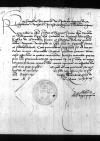List #5705
Sigismund I Jagiellon do Ioannes DANTISCUS, Tiedemann GIESE & Stanisław KOSTKAVilnius, 1540-12-18
Rękopiśmienne podstawy źródłowe:
Pomocnicze podstawy źródłowe:
Publikacje:
| ||||||||||||
Tekst + aparat krytyczny + komentarzZwykły tekstTekst + komentarzTekst + aparat krytyczny
Reverendis in Christo Patribus et Dominis
Gratiam nostram regiam, venerendi in Christo Patres ac Generosi, sincere et fideles dilecti.
Cum quorundam suspicione sit ad nos perlatum in arca
Dat(ae) or Dat(um)⌈Dat(ae)Dat(ae) or Dat(um)⌉
Ad mandatum s(acrae) or s(erenissimae)⌈s(acrae)s(acrae) or s(erenissimae)⌉ maiestatis regiae proprium

 BNW, BOZ 953, f. 197ra
BNW, BOZ 953, f. 197ra